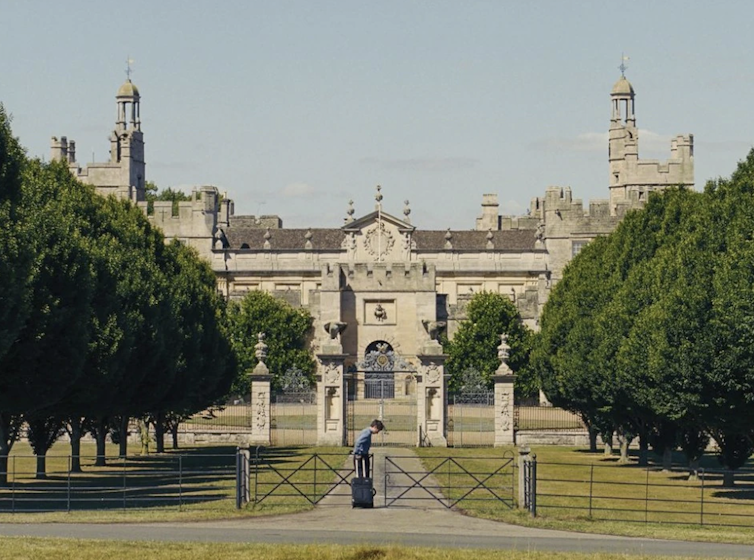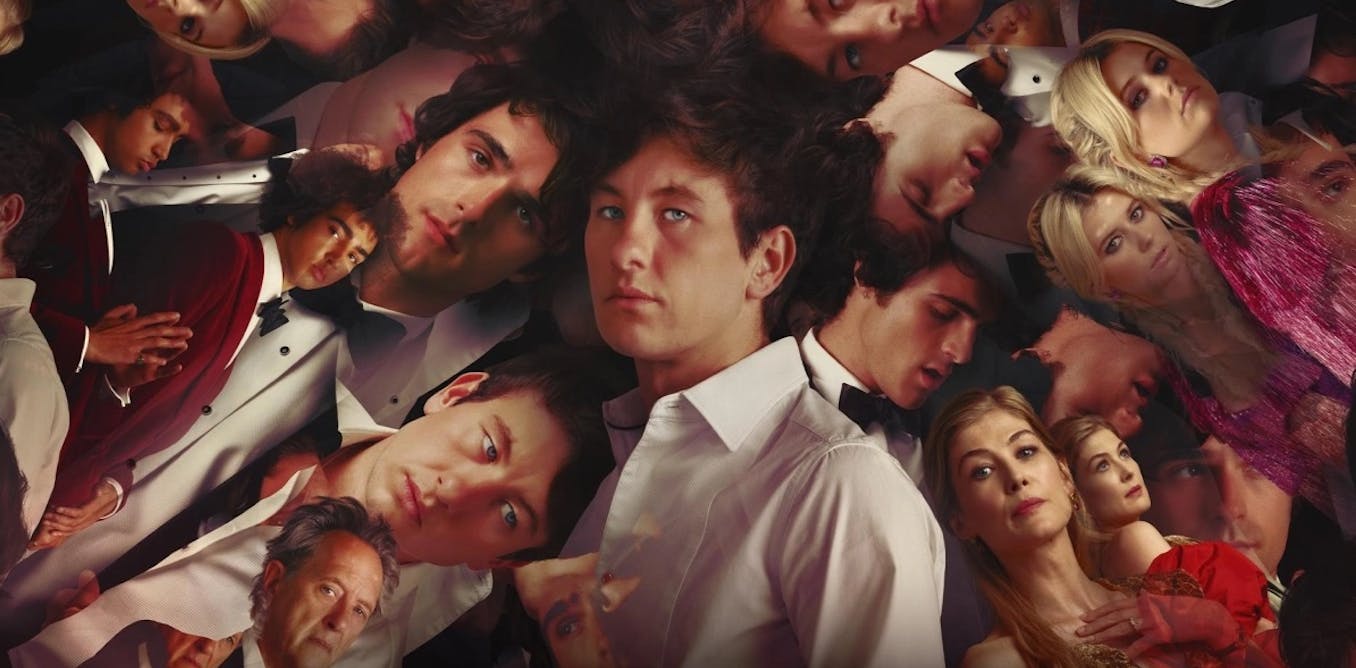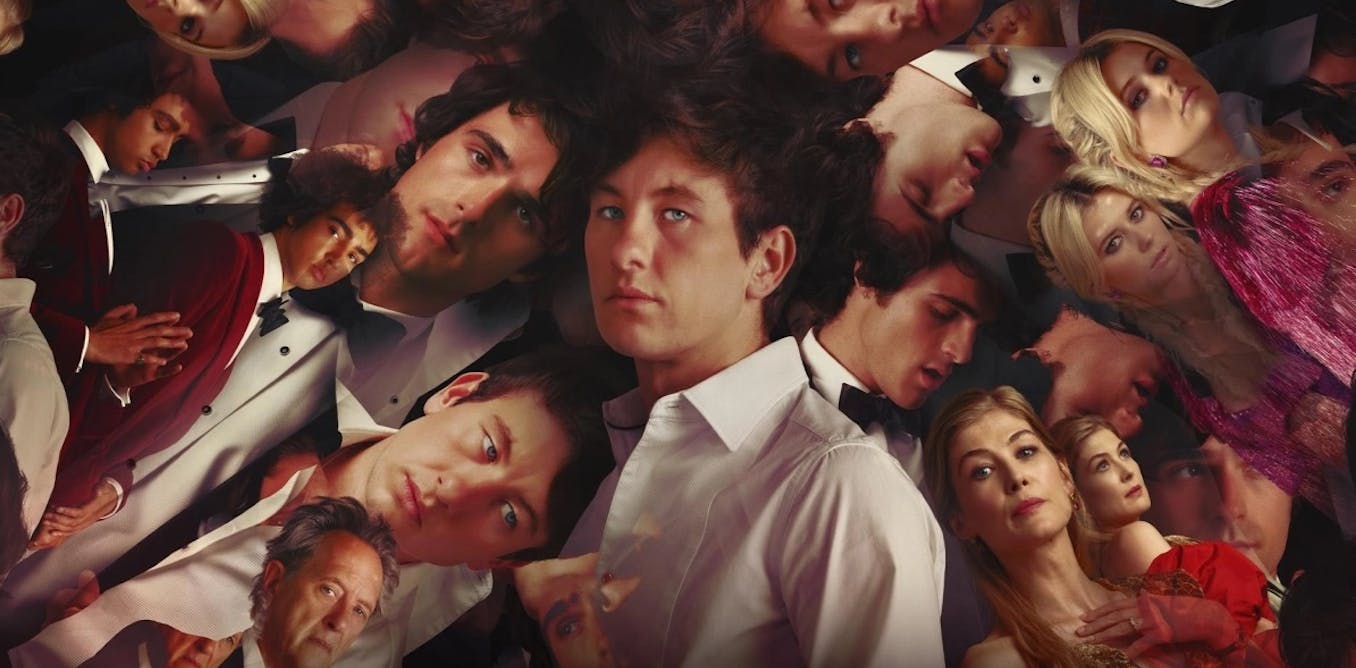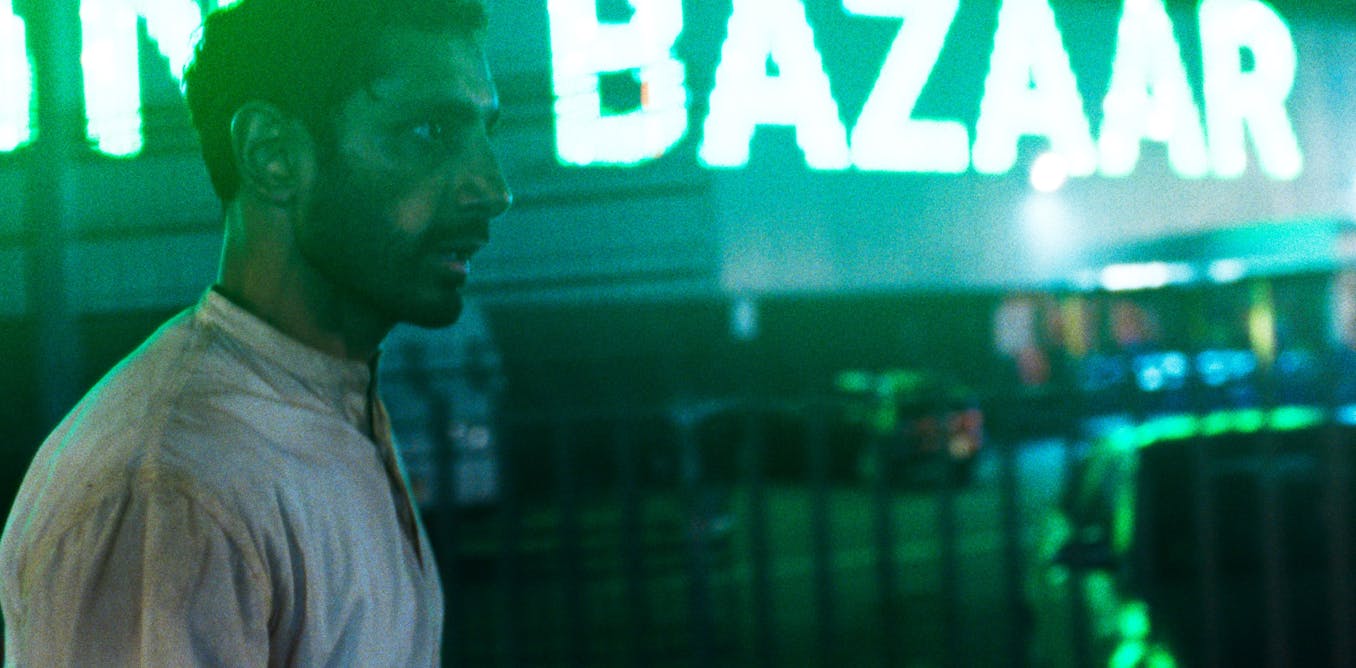Note: this article contains spoilers.
While Barbie and Oppenheimer battled it out for last year’s pinnacle box office position, my focus was rerouted toward a different, slippery interloper. Director Emerald Fennell’s sophomore film, Saltburn, proved to be so deliciously scathing, horny and tragic that I forged out in peak festive traffic to see it a second time.
Undeterred (egged-on, even) by the prior viewing’s gross-outs and walkouts, Saltburn seduced me with its visual swagger and infectious soundtrack: an iPod shuffle of musical kink and pot-luck noughties pop hits.
Propelled by its juggernaut social media success, Saltburn has eclipsed the popularity of more doggedly-marketed films. TikTok continues to erupt with matey soundbites from cast members and resurrected excerpts from Sophie Ellis Bextor’s 2001 track Murder on the Dancefloor.
Saltburn’s unreliable narration charts Oliver Quick’s (Barry Keoghan) destiny-cinching summer spent at the film’s namesake estate. The Catton family’s sprawling residence is home to silver-spoon siblings Felix (Jacob Elordi) and Venetia (Alison Oliver) and presided over by screwy toffs James and Eslpeth – brought to life with hilarious, lightning-rod alchemy by Richard E. Grant and Rosamund Pike.
Capturing the spirit of the noughties
A mid-noughties mix of MGMT, Arcade Fire and Cold War Kids invades this rarefied setting. One featured Bloc Party track, This Modern Love, unleashed my own long-forgotten memory of forcibly extricating myself from a surging mob of the band’s superfans at Reading Festival in 2009.
This experience captures the era’s pre-austerity flavour of hype and heedless abandon, manifested in maximalist sartorial choices: box-dyed hair with bonded extensions, factory-distressed denim skirts, Juicy Couture tracksuits and rubbery wristbands in lurid hues.
Courtesy of MGM and Amazon Studios
The high-voltage soundtrack also features various winky, kinky pop numbers. Have a Cheeky Christmas by The Cheeky Girls – “One, two, Santa Claus is coming / Three, four, filling up my stocking” – is a knowingly kitsch example.
A vengeful karaoke rendition of Rent by The Pet Shop Boys reveals the film’s puppet-master, intimacy-for-a-fee subtext, while a sweaty delivery of Flo Rida’s Low showcases the decade’s definitive outfit descriptor: “Apple bottom jeans / Boots with the fur (with the fur!)”. The privileged world of the pastoral British mansion feels wincingly out of step with the track’s crunk origins and urban club context.
These are unsubtle musical choices, but the soundtrack hums on a more deceptive frequency, too. Specific songs offer whispery hints of the characters’ sexual quirks and fantasies. Babybird’s You’re Gorgeous purrs in the background during a sunbathing scene. Its puppy-love chorus belies some spicy light-bondage lyricism.
https://www.youtube.com/watch?v=NQjc0uCzCjE
This euphemistic pop moment rejects the stiff musical majesty of the opening shots, when a blast of Handel’s Zadok the Priest announces Oliver’s arrival at Oxford University.
The scene is painstakingly inked with gold calligraphy, advertising the old-money legacy of the academy. In spite of a switch-up which sneakily embeds Oliver’s name into the score, its imposing audiovisual clout is writ large: “Behold: The bricks and mortar of the sacred institution!”
How pop music functions in the film
In contrast, the soundtrack’s persistent use of mainstream, secular pop feels less spelled-out, more fluid and alluring. Its coy charms seek to soften and dissolve the “hard power” of the establishment.
Many of the film’s songs are contagious – even parasitic – drawn from the familiar pop jukebox of our daily lives. They penetrate our consciousness, often without invitation. Their melodies misbehave like sly earworms, burrowing in, wriggling around naughtily and laying little eggs – colonising us from the inside out.

Courtesy of MGM and Amazon Studios
Easy-listening pop hooks are often contradicted by dark, enigmatic lyrics, just as Oliver’s docile demeanour masks his devious appetites. Like an undetected pest, he manages to bypass the sticky trap posed by an ancient strip of flypaper seen hanging from one of Saltburn’s decadent chandeliers. He sets about gnawing spiteful holes through the very fabric of the house.
Scenes where Oliver slurps semen from a bathtub drain or licks period blood from slick fingertips have met with gasps – but they’re not strictly for cheap thrills. These vampiric allegories reveal his plans to supplant heredity, symbolically swallowing down the Catton lineage from the level of the seed.
The film’s playful pop songs allow us to digest this gristly reality. They muddy our discomfort with pleasure, creating complicity. Even when we’re challenged by what we witness, their catchy strains coax us to tap along sportingly, lest we dare to “kill the groove”.
This is viscerally felt during the film’s final moments, as Oliver preens and postures like a puffed-up Graeco-Roman god. He dances naked through Saltburn’s ornate corridors, retracing his earlier welcome tour. Though a less obvious Adonis than Felix, Oliver’s ravenous, long-game erotic potency has paid dividends.
The glittery exuberance of Murder on the Dancefloor underscores this victory lap: a musical toast to the dethroning of the household heirs. Much like Oliver, the song’s resolutely feelgood energy shows no remorse for its savage schemes. He expels a final, satiated exhalation and the soundtrack stalls momentarily – bending the knee to Saltburn’s new proprietor.

Looking for something good? Cut through the noise with a carefully curated selection of the latest releases, live events and exhibitions, straight to your inbox every fortnight, on Fridays. Sign up here.

The post “The contagious pop power of Saltburn’s thirsty, tongue-in-cheek soundtrack” by Caitríona Walsh, Lecturing in Film Music & Piano, University College Cork was published on 01/23/2024 by theconversation.com




































